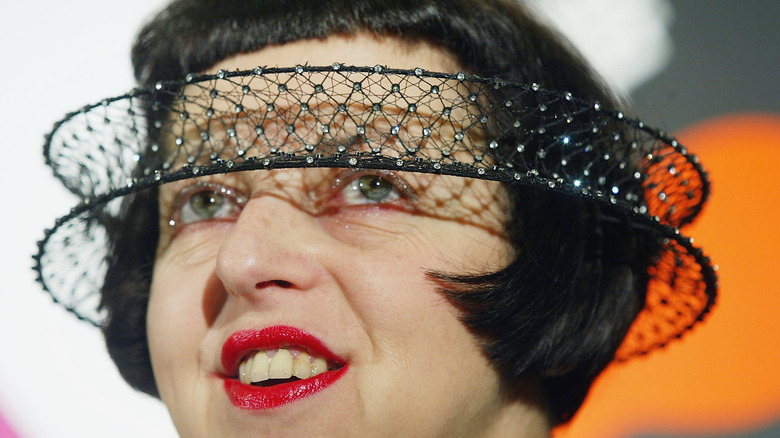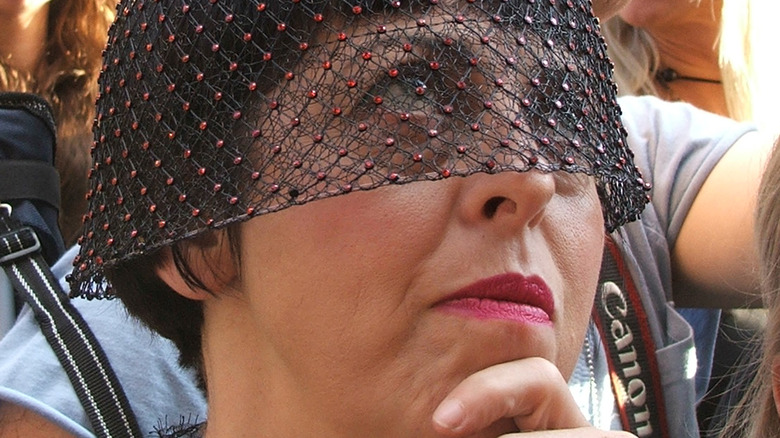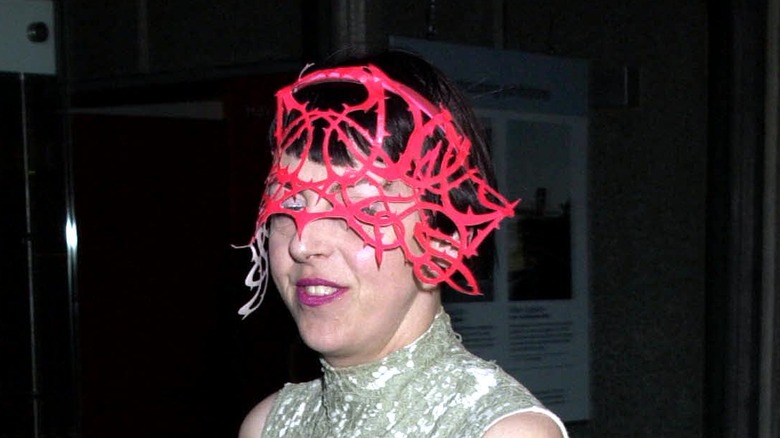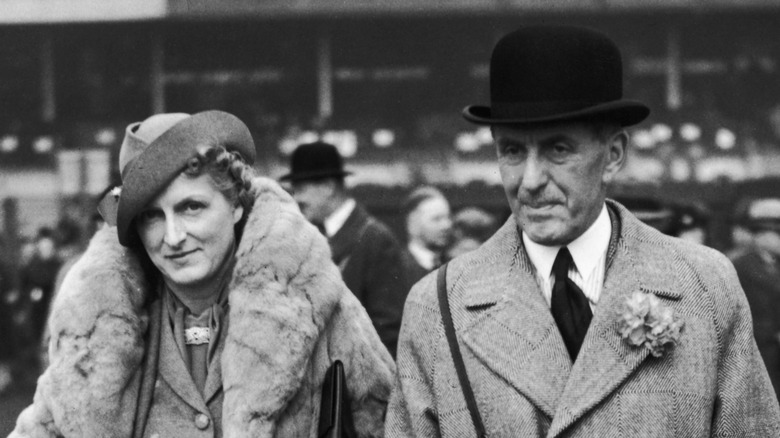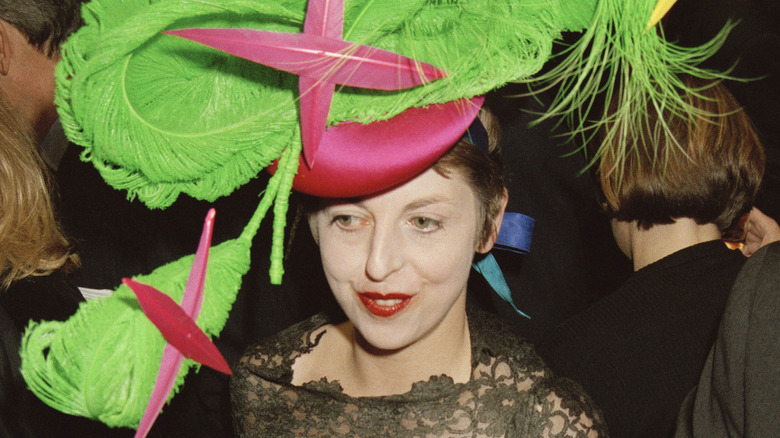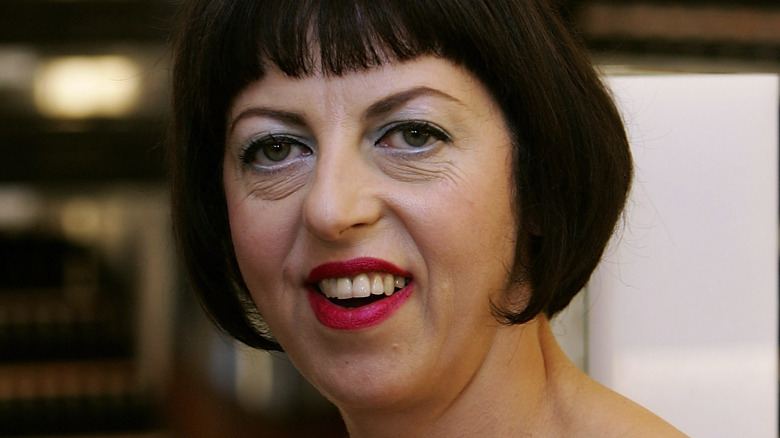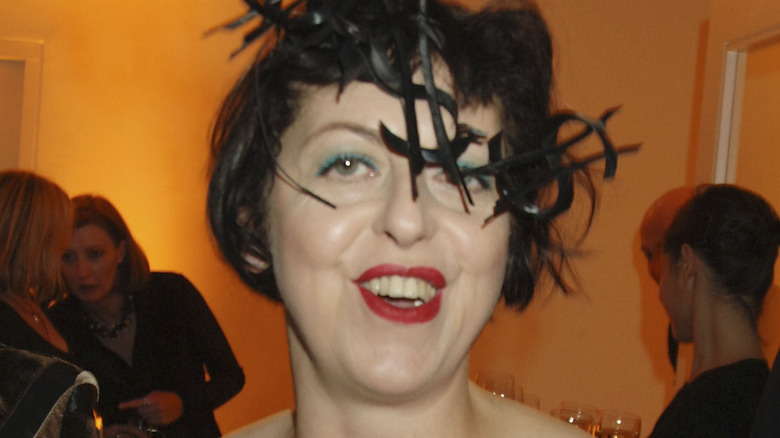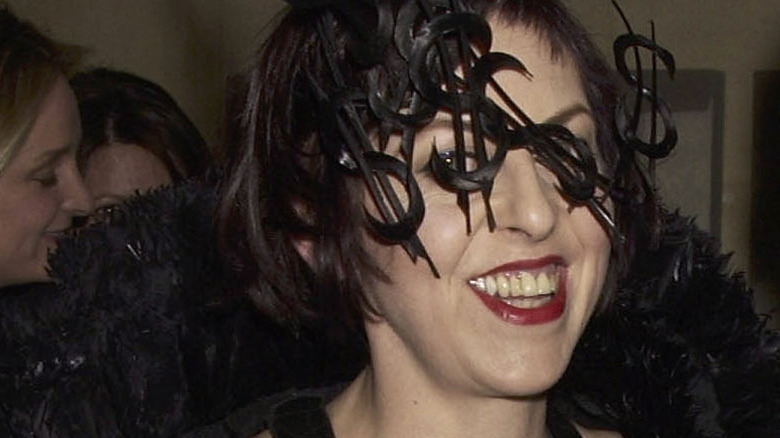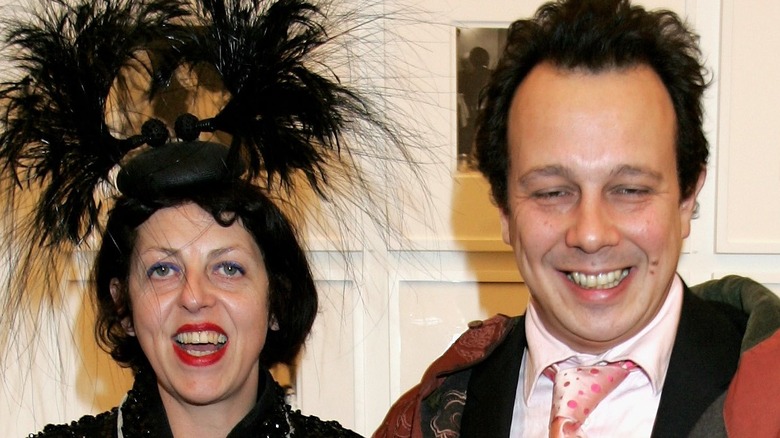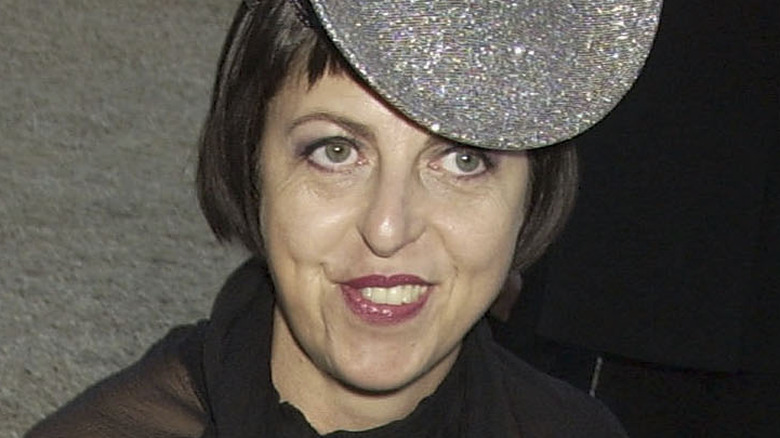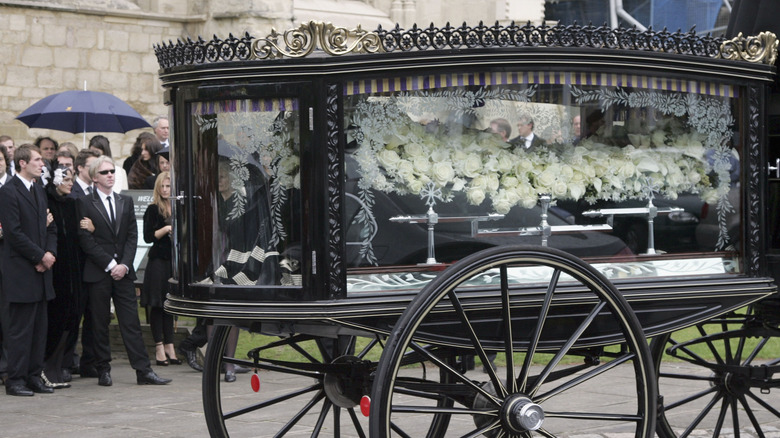The Tragic Real-Life Story Of Isabella Blow
The full extent of Isabella Blow's tragic story came to light only after she died, with various people in the fashion industry celebrating her contribution and legacy. They've praised her for her exquisite taste, wild ideas, and her outfits, which became an artistic expression itself.
The fashion editorials she oversaw as a magazine editor and stylist became legendary, and she was often described as one of the most influential people in the fashion industry. Working for names as Tatler, Vogue, and The Sunday Times, she positioned herself as someone who had a unique eye, as per Vanity Fair. Discovering talents such as designer Alexander McQueen, hat designer Phillip Treacy, models Sophie Dahl and Stella Tennant, she worked as a godmother of the fashion world, paving the road to success for many people, but not herself.
Born into an aristocratic family line full of intrigues, overspending, and marital affairs, she experienced a traumatic, uprooted childhood from which she never properly healed. Struggling constantly with bipolar depression, her endeavors weren't as fun as they looked from the outside. Her luxurious lifestyle was only a smoke screen for a life full of fear, longing, and self-loathing.
Unable to have any children on her own, she gave her attention and love to the people around her. Her marriage to Detmar Blow, a British art dealer, was just as stable as her mental state. Being surrounded by people similar to her, not being able or wanting to recognize the seriousness of her condition, she died all to soon. Here is the tragic real-life story of Isabella Blow.
The day her brother drowned
According to journalist Edward Helmore for Vanity Fair, Isabella Blow experienced her first tragic event very early in life, growing up on her family's estate in Staffordshire, England. On September 12, 1964, her 2-year old brother, Johnny, drowned in a half empty pool. Four-year old Isabella was supposed to look after him, while their nanny was on holiday.
As stated by Detmar Blow, Isabella's husband, neither Isabella nor the rest of the family ever recovered from the accident (via Daily Mail). Detmar hinted that the real reason for Johnny's death was a combination of chilly water and poor digestion, given the fact that the boy ate only baked beans in the absence of a nanny (via New York Magazine).
Isabella always wore lipstick later in her adult life, and as she recalled for Vanity Fair, this compulsion could stem from this tragedy: "I can remember everything about it. The smell of the honeysuckle, and him stretched out on the lawn. My mother went upstairs to put her lipstick on. That might have something to do with my obsession with lipstick." As she confided to The Guardian journalist Emine Saner, after the tragedy, her parents lost all interest in the three girls who were still alive, Isabella and her sisters, Lavinia and Julia.
Her mother left when she was 14
As Detmar Blow recalls in his biography, "Blow by Blow," Isabella Blow's family started to fall apart quickly. Isabella's parents, Lady Helen and Sir Evelyn soon grew apart. Helen stayed in London more and more, not being fully satisfied with a dull country life. When she couldn't attend a planned travel journey due to a medical operation in 1973, Evelyn visited Asia alone. He met an exciting and young woman, Rona Crammond, and soon they became a couple.
Isabella and her sisters were safely stacked away at the Heathfield boarding school during that time. Isabella was 14 when she suddenly got the news of her parents divorcing. No one came to tell her about the announcement in person, she was informed by a letter, which she read during a lunch hour and left the dining room in tears.
But, as Detmar emphasizes, Isabella hated her mother. So, when Helen said her goodbyes by simply organizing the kids outside in the courtyard and shaking their hands in farewell, that was the final straw for Isabella and her feelings towards her mother. She had always despised her for not being aristocratic enough, born into a shop trade business in northern England, and lacking exquisite taste common for high society.
But her stepmother wasn't an upgrade. Isabella and Crammond started on a very wrong note from the beginning – when Isabella returned from the boarding school in 1974, her roos were given to her new stepsisters.
The legacy of an eccentric family
But Isabella Blow's own tragic family experience wasn't the only thing that burdened her soul. She was the descendant of some intense individuals, whose legacy was felt strongly even after they died.
As reported by Vanity Fair, her grandfather, Sir Henry John Delves Broughton, also known as Jock, was a jolly man of very poor financial skills. He managed to bankrupt his family with bad investments and an excessive gambling habit, instilling the fear of poverty in his offspring for generations to come. But to make matters worse, he also loved beautiful women. He lost his temper in 1940 after his second wife, Diana Broughton, had a public affair on their trip to Happy Valley in Kenya. Her lover, Josslyn Hay, was soon found dead, and Henry was charged with murder. Despite being legally discharged, his reputation was ruined, and he died by suicide in 1942.
As reported by Dazed, the ancestor Isabella Blow admired was her paternal grandmother Lady Vera Delves Broughton, a unique woman of great vigor and courage. A world traveler, she apparently picked up some nasty habits, including developing a taste for human flesh. As stated by Detmar Blow for New York Magazine, Vera unknowingly had some in Papua New Guinea but demanded more of it even after she was told of its origin.
Continuous lack of money
Thanks to her grandfather's bankruptcy, Isabella Blow's family had to adapt their living according to more modest means. According to "Blow by Blow," by Detmar Blow, only 10% of the family estate wasn't sold off yet, and Isabella's father had to come up with innovative ways to make money if they wanted to stay in Staffordshire. He decided to turn the estate into a farm, which turned out to be a success. As a result, he family moved out of the palatial main house to a much smaller head gardener's cottage, a move that Isabella "resent" all her life.
Isabella's father managed to keep the family property from the auction block throughout his life but decided to sell half of it when he turned 65. When he died in 1994, he practically disinherited Isabella, leaving her only £5,000 as an inheritance — regardless of the fact that he was worth £6 million.
Financial struggles and insecurity plagued Isabella all her life. According to Detmar Blow (via The Guardian), she was severely incompetent when it came to dealing with money, spending everything on clothes and other luxury items. She often spent the whole budget she was given working as a fashion editor on random personal things, and Detmar was regularly her only rescue. At some point, working for Tatler magazine, she wanted to claim £50,000 in expenses for a purchase of "a very small ruin, which really was a must," as per The Guardian.
Isabella Blow wasn't given credit for her work
Isabella Blow lived for art and fashion, adoring everything that was rare and unique. The fashion world loved her authenticity, as the legendary Vogue editor Anna Wintour told New York Magazine: "No one had an eye like Issie. The more corporate of us look at everything differently than someone like Issie, so whenever I got that phone call that Issie said I should see something, I would go."
But her killer taste was not enough to garner her accolades or compensation. According to Vanity Fair, she rarely got paid or recognized for any of it while alive. "She was brilliant at finding new things ...," said photographer Mario Testino. "But it was hard for her to define her job, and it was hard to find ways to pay her. So you find a designer, or you find the model, but how do you invoice for that?"
After her death, The Somerset House organized an exhibition "Isabella Blow: Fashion Galore!" in her memory. But as friend and designer Phillip Treacy told The Telegraph, things were different when she was still alive: "She was never feted while she was alive. ... She supported the careers of many young people who didn't stand a chance without her, yet she never won a single award. It's all very well them feting her now and going on about how wonderful and brilliant she was. There will be people at that exhibition who laughed at her when she was alive."
Forever the ugly duckling
The frustration of being ugly started early in Isabella Blow's childhood, and living with her beautiful stepsisters only made matters worse, as per "Blow by Blow." She resented her parents for not fixing her noticeable teeth, and even though she was happy with her slim figure, she found her face very ugly.
According to Detmar Blow, the hatred of her features was something she carried inside all of her life. At one point she said, "It pains me to say so, but I'm ugly. I know that's subjective, so perhaps I should say instead that I'm striking. My face is like a Plantagenet portrait" (via New York Magazine).
Being surrounded with models and other exceptionally beautiful humans, her confidence could hardly ever recover. But she did find a way of bypassing her deep discontent — she developed a fashion style out of covering her face, with hats, dresses, and other accessories. She was known and loved for her unique taste and impeccable eye for originality, but that could all be her hiding her self-doubt. As Anna Wintour told Vanity Fair, "One always wondered how she really felt about herself that she had to camouflage herself in these extraordinary outfits. That was there from the word go, but it got more extreme as she got older."
From fertility issues to ovarian cancer
One of Isabella Blow's great desires was to have a child, but she and Detmar Blow couldn't conceive. According to New York Magazine, the couple went through the IVF process several time, without any success, despite the fact that doctors couldn't find any medical reason for infertility: "We are like a pair of exotic fruits that cannot breed when placed together," Isabella once said (via "Blow by Blow"). She was inconsolable, and the issues compounded her struggles with self-worth, declaring at one point, "If a woman cannot produce a child, she is not fulfilling her biological duty." In her mind, she failed yet again.
According to Vanity Fair, Isabella knew how badly her husband's family wanted an heir, so the two separated, with the sole intention for him to find a woman who would be able to give him a child.
The numerous attempts to get pregnant were intertwined with other problems she had with her reproductive health. Undergoing an ovarian cyst operation, anesthesia only made her depression worse, reports Vanity Fair. But in 2007, when she ended up in a hospital in Kuwait after her sixth suicide attempt, doctors found ovarian cancer. According to Detmar, that was something she couldn't handle, the possibility of losing her uterus, despite the fact that the recovery rate after a hysterectomy was 94%. She didn't want to undergo any treatment anymore, she just wanted to die.
Losing her home twice
Isabella Blow felt like she lost her home in teenage years, being evicted from her room in her family home. According to "Blow by Blow," this led to some hectic years in London, where she earned money doing every possible odd job, even cleaning.
But the story would repeat itself when she was married to Detmar Blow. According to Vanity Fair, she put all her effort into decorating their home at Hilles, a big mansion in the countryside and the family home intended for the couple. She brought life to the old deteriorating house, believing it would someday be her legal home.
But things didn't go as they planned. Detmar's mother disapproved of their lifestyle full of lavish dinner parties and eccentric characters. But most of all, it was the Blow's inability to earn money to sustain themselves and the estate.
Furthermore, since Isabella and Detmar couldn't have children, Detmar's mother decided that Hilles should go to Detmar's sister and her family. After many fights and even legal battles, the Blow's had to move out. And as Phillip Treacy noted, "that was the beginning of the end for Isabella."
Sharing a husband
According to Vanity Fair, Isabella and Detmar Blow got engaged only 16 days after they met in 1989, which surprised quite a few people — Detmar being six years younger then Isabella. They've lived through an intense few years, moving between parties, money problems, Isabella's manic episodes, and family drama.
Unable to get pregnant and feeling pressured from Detmar's family, Isabella proposed a breakup for Detmar to find himself a new wife. They were separated 18 months, during that time Detmar dated lesbian writer Stephanie Theobald, and Isabella lost more money in a financial dispute to an Italian lover. Their reconciliation was more bitter than sweet. After Isabella spent some time in a mental institution in 2003, Detmar got a phone call from Isabella's psychiatrist who urged him to return for Isabella's mental health, he wrote in his book, "Blow by Blow." Detmar obeyed.
But when she attempted another suicide in India in 2007, he didn't fly there to support her, recalling he couldn't get a flight. He said he wouldn't have gone regardless: "I would be no use to her if I had a mental breakdown as well. Thank God Issie pulled herself together and was able to get back home."
As Detmar told the Daily Mail, he got a lot of criticism from her friends, including Alexander McQueen, for not being there for her when she needed him the most. He rebuffed all claims.
The battle with manic depression
According to "Blow by Blow," Isabella Blow was convinced she inherited her depression from her suicidal grandfather. As designer Zac Posen told The New York Times, "thoughts of suicide were a big part of her existence and her persona." She often struggled with ideas of dying, saying numerous times she wanted to die: "She wouldn't shut up about it!" Vogue editor Hamish Bowles told New York Magazine.
People loved her for her high energy, and because she didn't follow the rules. But this intensity was an act, hiding a much darker truth underneath — her manic episodes cost her jobs, relationships, and financial stability.
Her mania made her more and more demanding, and the periods of melancholia grew longer. She couldn't handle her work or social obligations, which led her to try electric shock treatment, but neither that nor pills helped her to feel good again.
She tried to take her life many times, even as she was receiving help and surrounded by loved ones. As Anna Wintour told Detmar Blow, "There was a saddening inevitability about what was going to happen. She's decided to embark on the journey, and she had every intention of taking it."
If you or someone you know is struggling with mental health, please contact the Crisis Text Line by texting HOME to 741741, call the National Alliance on Mental Illness helpline at 1-800-950-NAMI (6264), or visit the National Institute of Mental Health website.
Isabella Blow gone all to soon
In 2007 Isabella Blow decided she had enough. On May 5, she ended up in a hospital after another suicide attempt. According to Vanity Fair, she recovered enough to greet her husband and some of her closest friends. As Philip Treacy remembers, she was in high spirits, "even as she was dying, she was making everyone laugh." Two days later, she quietly died in her sleep.
It was hard for her inner circle to admit Isabella wanted to die. As Selina Blow, Isabella's sister-in-law, told The Guardian, Isabella's was in bad health due to a recent ovarian cancer operation. In fact, Detmar Blow's official statement was that the cause of Isabella's death was cancer, and he maintained this story in an interview with The Guardian: "I've steered people away from the prurience. She had cancer. That's it. She's dead now. We can't change it. But we can celebrate her life, and our love for her."
But even in her last hours, Isabella didn't forget about fashion. Wearing a silver lamé blouse on her final hospital bed, she kept her sense of style. When Alexander McQueen allegedly visited a medium soon after Isabella's death, the medium reported Isabella was with her grandmother, feeling well. A few days later she had another message from Issie: "And by the way, my mother is not to have any of my hats or shoes" (via Vanity Fair).
If you or anyone you know is having suicidal thoughts, please call the National Suicide Prevention Lifeline at 1-800-273-TALK (8255).
